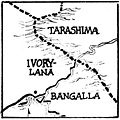Bangalla
Bangalla is the country where the Phantom lives, formerly known as Bengali.
According to the Newspaper strip
Government and politics
Bangalla is a former British Commonwealth country that became independent in the 1960s.
After the independence, general elections were held and dr. Lamanda Luaga was elected the first president of Bangalla. His opponent, General Bababu, opposed the election results and a civil war broke out. Bababu seized power briefly until the civil war was over and president Luaga was reinstated. Ambassador
The judicial system is based on the British, with judges wearing wigs and hanging is used as a capital punishment. The Tarashima Terrorists
Death penalty has been put on crimes, such as taking drugs into the country Drug Busters and may also be imposed on possesion of drugs. The Drug Cartel Attempt to kill the president is also a crime that may result in death penalty. Ambassador
The president is the supreme commander of all the army forces Ambassador and has the power to momentarily suspend at least some laws. The Doorman
Geography
Map of Bangalla's border to democratic Ivory-Lana and dictatorial Tarashima.
Map of Bangalla's border to the dictatorship Ughland.
Bangalla is an African country, and some of its neighbors are Ivory-Lana, Tarashima, Ughland, Floradona, Rhodia, and the countries of the Misty Mountains.
The capital is Mawitaan, formerly known as Morristown. Other cities include Bengalitown, Sanloi, and Spyglass.
Behind the scenes
The Phantom's home country was originally the island of Luntok in Asia. Later on, Lee Falk introduced the name Bengali, and inserted more and more African influences. In the 1960s, the location of Bengali was established to be in Africa, but the exact location is uncertain. Even though several neighbor countries are known by name, it is not entirely clearly where they are located in relation to each other. Maps appearing in the strip has shown the country to be near Zanzibar, Ethiopia, Kenya and Cameroon. In the 1970s, Lee Falk changed the name of the country to Bangalla.
According to Team Fantomen
Government and politics
Bangalla is a former British Commonwealth country that became independent in the 1960s.
After the independence, general elections were held and dr. Lamanda Luaga was elected the first president of Bangalla. His opponent, General Bababu, opposed the election results and a civil war broke out. Bababu seized power briefly until the civil war was over and president Luaga was reinstated. Ambassador
Later presidents include Kigali Lubanga and Sandal Singh, a female Singh pirate.
History
At least parts of current Bengali was part of the Swahili culture during the time of the first Phantom, with Moribar being a Swahili city. The Avenger
In the 17th century, most of current Bengali was part of Emperor Joonkar's empire Nyahpura, and some cities like Spyglass were ruled by a sultan, others were independent or belonged to European nations. At the beginning of the 18th century, even Spyglass belonged to Nyahpura. After the assasination of emperor Joonkar and the defeat of the Singh pirate Abba Singh, Nyahpura had a few years of democracy before a famine ruined the country. Black Glove, Part 1 Pirate Hunt The Last Emperor
In 1717, Sanloi was an independent city. The Avenger from the Sea
In 1735, the rich Bengalitown was sacked by pirates and never recovered. The treasure reemerged first in modern times, giving back some of the former glory to the town. The Treasure of the Barracuda
Around the 1780s, there was a British governor in Bengali by the name of Percy. The 12th Phantom payed him a visit. Mystery of the Golden Rune, Part 4: Cagliostro Mystery
After the turn to the 19th century, Moribar was a fast growing city within the British Empire. Revenge of the Pirate Queen
During the time of the 14th Phantom (1811-1831), the British governor Sir William G. Loder turned worked with pirates, using the alias "the Scarecrow". Kingdom of the Pirates
By 1826, the British governor sir Cedric had made all of Bengali a British colony, but he was involved in the opium trade and was arrested and sent back to England for trial. Pirates of the Yellow Snake
In 1827, the British governor, Lord Flimsey, cooperated with a slave catcher, realizing too late that slave trade was illegal and punishable with death. The 14th Phantom informed him about this and he repented, and also grew a beard to cover a skull mark. The Mysterious Cave, Part Two: Ch'Gaan's Curse This possibly took place before the time of William G. Loder.
In 1831, the Jungle Patrol was reformed with an unknown commander after some tragic events. The Unknown Commander Part 2
Sometime after 1826 was Moribar renamed Morristown. Pirates of the Yellow Snake
In 1868, the British governor sir Stamford Bridges had a railroad built with slave labor. When this was revealed, he accidentally killed his own son, Lieutenant Nicholas Bridges. The Slave's Railway
Towards the end of the 1880s, the British governor, Lord Hawkwood, cooperated with pirates for a couple of years until he was finally exposed by the 17th Phantom and Richard Fernwhistle, the son of former governor sir Lionel Fernwhistle who had been murdered by Hawkwood's associates. The Governor and Scarface
By the end of the 1920s the British governor repeatedly tried to merge the Jungle Patrol with the regular British forces, without success. The Triads, Part 1: Deadly Cargo
Geography
Map of Bengali and Haman West of The Indian Ocean
Bengali is an East African country, and some of its neighbors are Ivory-Lana, Tarashima, Rhodia, and the countries of the Misty Mountains. The Capital is Morristown. Other cities include Bengalitown, Sanloi, and Spyglass.
Behind the scenes
The names of Bengali and Morristown have not been changed to Bangalla and Mawitaan in the Team Fantomen stories.
According to Moonstone
Geography
Bangalla is located on the west coast of Africa, roughly where the Democratic Republic of the Congo is located in reality. Bangalla borders among others Angola, Zambia, Uganda, Ivory-Lana and Tarakimo.




